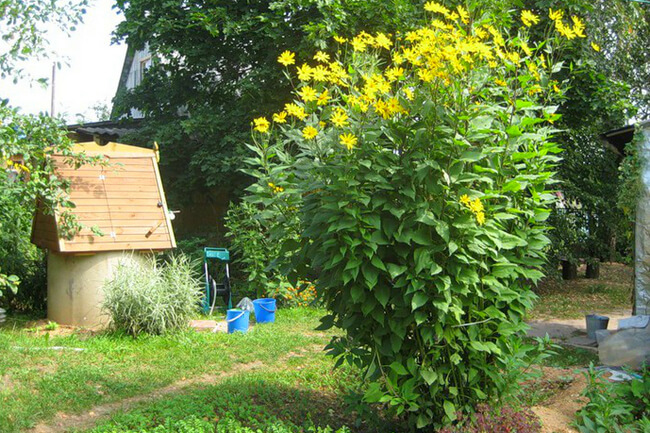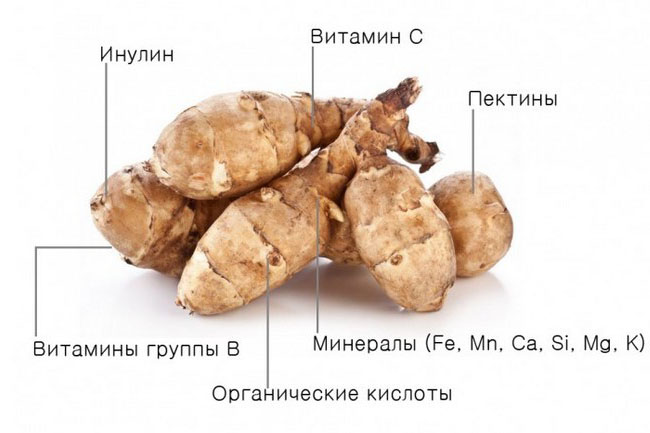Jerusalem Artichoke as a Cure for Diabetes: Myth or Reality?
It is useful for curing anemia, for the health of joints, high blood pressure, skin diseases and for the gastrointestinal tract. Chemically the composition of its tubers resembles potatoes, but with slightly less starch content and a certain amount of inulin. It has a rather specific, pleasant flavor similar to the cabbage core and sweet radish.
Despite all the dietary and medicinal properties of this plant, it is quite often undeservedly forgotten. However it is not forgotten by diabetics. People who have used Jerusalem artichoke in diabetes note a positive trend in the course of the disease and an improvement in their overall health. Myth or a miracle cure of traditional medicine?
Information for reference
Jerusalem artichoke (earth pear) is a perennial plant from the sunflower genus of the Asteraceae family. It can grow to a height of 4 meters. It has a sturdy stem and small, delicate leaves covered in delicate, short hairs. Its top blooms with small yellow flowers that resemble a combination of chamomile and sunflower. The plant has a very developed root system: on the below-ground shoots form white, yellow, violet or red tubers. In terms of appearance and chemical composition they resemble potatoes.
It is grown for various purposes:
- decoration of plots,
- as a hedge,
- a food crop,
- fodder for livestock,
- a medicinal plant that is able to successfully fight various diseases.
Over 300 varieties are known.
Myths and reality
In order to avoid raising false hopes for those who see Jerusalem artichoke as their salvation, some myths should be dispelled.
Can Jerusalem artichoke cure diabetes?
No.
It is not worthwhile to succumb to illusions that it will save you from this disease. If it were possible, modern medicine would have already started using it. Its use as a supplement can only reduce insulin dependence, since the plant contains inulin – a polysaccharide that is responsible for binding glucose and its subsequent excretion from the body. As a result the blood sugar level decreases and the overall well-being improves significantly. However there can be no talk of any complete cure. Jerusalem artichoke helps the pancreas to synthesize additional doses of insulin, but only partially.
Can regular intake of Jerusalem artichoke replace insulin injections in type 1 diabetes?
No.
Firstly because this vegetable contains inulin, but this is not an analogue of insulin. These are two different substances which should not be confused.
Secondly, the rate and completeness of its absorption depends on the individual characteristics of a person and many other factors. After eating Jerusalem artichoke, its inulin may either be completely broken down and go to its intended use or not enter the blood at all (because of impaired digestion, overeating, and various diseases of the circulatory system).
Thirdly, the composition, concentration and properties of inulin are all significantly lower than insulin which is injected for diabetes.
Are there any alternatives to Jerusalem artichoke?
There are.
Inulin is also found in the following plants: chicory, garlic, onion, asparagus, burdock, coltsfoot, dandelion, elecampane, echinacea, bananas, etc. All these can help with diabetes. That is why the statement that this artichoke is a unique plant without any alternatives in this respect is just a myth. It’s simply that the other products listed are not as pleasant to the taste. Bananas are an exception but the inulin content in them is not so high and the high glycemic index does not allow diabetics to consume large amounts of them.
Benefits and harmful effects
Medicinal properties
The value of Jerusalem artichoke in diabetes lies specifically in the action of inulin, which lowers blood glucose levels and reduces the symptoms:
- reduced desire to urinate,
- reduced thirst,
- weakness and lethargy give way to vivacity, increased efficiency,
- appetite normalizes,
- weight stabilizes, either decreasing with excess weight or increasing in case of deficiency,
- dryness of the skin and mucous membranes disappears,
- muscle weakness and spasms gradually disappear,
- the risk of vision impairment, which is frequently diagnosed with prolonged illness, is reduced.

Jerusalem artichoke bush
Experts note the high efficiency of Jerusalem artichoke as an adjuvant in the treatment of not only diabetes but also metabolic syndrome.
Beneficial effects
Diabetes is a condition with many complications and diseases, since the lack of insulin and an excess of blood sugar affects the functioning of many organs. Therefore diabetics should be aware of other possible benefits of Jerusalem artichoke and what problems it can help resolve along the way:
- it removes toxins from the body,
- lowers the level of ‘bad’ cholesterol,
- breaks down fats, contributing to weight loss, since it is one of the best dietary foods (61 calories per 100 g, GI = 15 units),
- improves digestion, restoring intestinal microflora,
- improves assimilation of vitamins,
- strengthens the immune system,
- has antitumor, diuretic, laxative and vasodilating properties,
- helps to improve general health with tachycardia, anemia, varicose veins, ulcers, dysbiosis, gout, neurosis, skin diseases and osteochondrosis.
Jerusalem artichoke is a useful product not only because of its inulin. It also contains silicon which:
- improves brain activity, in particular the pituitary gland,
- normalizes thyroid function,
- lowers the risk of heart disease,
- helps to ensure correct kidney function.
There is a claim that the uniqueness of this plant is in the ability of its roots to filter the substances absorbed from the soil. This means that regardless of the ecological circumstances of the place where it grows, it will not contain in its parts pesticides, radionuclides, nitrates or heavy metal salts which poison the soil.

Some sources dispute this point of view and say practically the opposite: that Jerusalem artichoke is a vegetable ‘garbage collector’, which accumulates the maximum amount of toxins. But even if this is so, it is not necessary to be afraid of it: inulin binds toxic substances, rendering them completely harmless to the organism.
Harmful effects
Diabetics should be aware of the possible harmful effects of regular consumption of Jerusalem artichoke. It is especially important for them, since any deviation from a healthy state can threaten to become a serious problem.
First of all, it causes flatulence. It is necessary to be prepared for this. Secondly, it may intensify already impaired blood coagulation. Thirdly, it often causes stones in the body to move, which is fraught with severe pain, the blocking of ducts and channels and also their rupture, which in extreme cases can lead to fatal consequences.
Interesting fact. The vegetable received its name after the eponymous province in North America (where the Tupinamba tribe lived), from where this agricultural crop was originally brought.
Contraindications
In some diseases and conditions which may be diagnosed together with diabetes, Jerusalem artichoke is contraindicated for regular use. These include:
- individual intolerance,
- allergy,
- a tendency to flatulence and abdominal distension,
- impaired blood coagulation,
- cholelithiasis and urolithiasis,
- gastritis with low acidity and impaired digestion (in this case it is contraindicated to consume it raw).
It is necessary to consult your doctor first to minimize the risk to your health.
Other names: Jerusalem artichoke, earth pear, Russian turnip, bulba (bulwa, barabola), American Jerusalem artichoke.
Methods of use
In order to obtain the maximum benefit from Jerusalem artichoke it is necessary to learn how to use it correctly.
In what form to use it
- Tablets
It is possible to purchase nutritional supplements containing inulin which is obtained from Jerusalem artichoke tubers and take them in accordance with the instructions. The best known brands are Neovitil, Dolgolet


